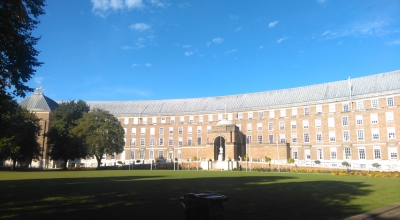
 I was lucky enough to snag tickets for both days of the 2017 LocalGovCamp, this year held in the magnificent Bristol City Hall on the 15th & 16th September. Yes, that was a Friday and a Saturday - events like this are worth giving up part of your weekend for!
I was lucky enough to snag tickets for both days of the 2017 LocalGovCamp, this year held in the magnificent Bristol City Hall on the 15th & 16th September. Yes, that was a Friday and a Saturday - events like this are worth giving up part of your weekend for!
As with previous LocalGovCamps, the two days were full of informative sessions, and useful discussions with peers and suppliers. The focus for everyone, of course, was finding better ways of working and communicating, in order to provide the best service we can for the public. It's taken me this long to go through my notes, get everything out of my head onto a draft, and then cut, rewrite and restructure it into a relatively coherent (albeit longer than normal) pair of blog posts.
When it comes to events like this, I'm always in awe of what others are doing. First of several confessions in a confessional pair of posts: I do feel a little ashamed that I'm not as organised or driven as those (individuals and teams) who have built some wonderful and useful things to make it easier the public to interact with local authorities. With that out of the way, here's the first part of the round-up of the event...
Day 1
The fringe event
The first day, known as the "fringe" event, differed this year, going for a formal series of seminars/discussions over the usual hack-day approach. These were facilitated by some of the suppliers and representatives from Bristol City Council and GDS, with a clear rule that these weren't sales driven.
These were quite useful, covering the use of data, performance metrics and user testing to produce, maintain and improve service offerings, as well as the potential benefits of AI to support and enhance what we already have.
The most interesting session (and relevant to our current work on new.shropshire.gov.uk), was the process Bristol City Council went through in developing their new website and related online services. A lot of the challenges they faced mirrored what we've encountered over the years, as did their user-centred approach to building web services. What differed was their reliance on the GDS design principles, which place importance on data and more proactive user testing (going out and talking to people on the street to get real user feedback) to combat those challenges, as well as the agile approach to getting things out quickly and adapting them. As a result, they've managed to turn around a new online service that looks good, as well as working effectively for their public.
Second confession - I was part of the steering group that helped create the Local Government Digital Service Standard (LGDSS), based on the GDS standards that Bristol used. It was always my intention that we adopt the LGDSS, but, alas, with the constant churn of work I never got round to introducing the new ways of working within the team. With new.shropshire.gov.uk nearing "graduation day" (all being well it will be promoted to be "shropshire.gov.uk" in late October), it's a good opportunity to start working to these standards where we can so that the site continues to iterate and improve.
Third confession - I missed out on one of the sessions in the afternoon. There was a shuffle round in the schedule, which meant that the session I was intending to go to was moved and clashed with another (the flip of a coin decided which one I actually went to). As a result, the "free" session I ended up in was spent chatting with a few of the suppliers, and ex-Shropshire Council bods, Lorna Perry - whose name you may recognise as a Project WIP alumni - and Nigel Bishop. Got a few ideas of "the art of the possible" with technology, and had a good catch-up, so still put the time to good use.
What happened next?
Well, technically the social happened next (a meal and a few drinks with fellow attendees who were staying in Bristol), but the next post is all about day 2 - the unconference.